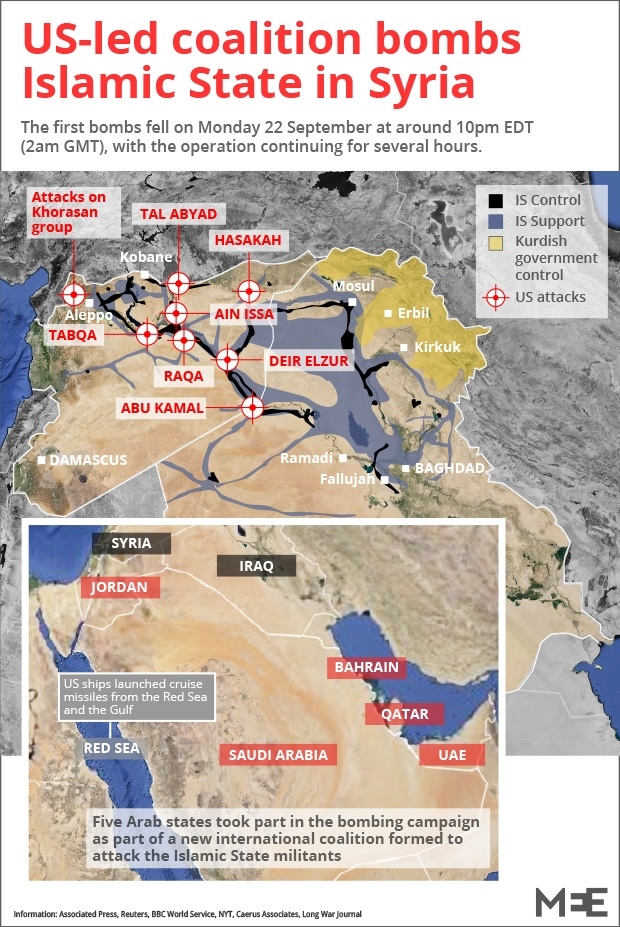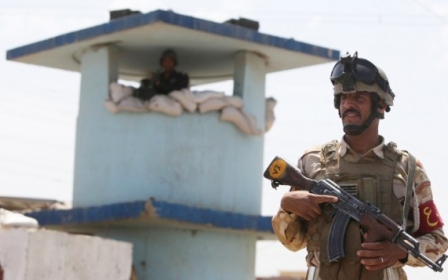US-led coalition bombs Islamic State in Syria

The United States and its Arab allies early Tuesday launched aerial raids against Islamic State in Syria (IS), opening up a new front in the battle against the militant group after more than a month of US airstrikes in Iraq.
An unnamed US official confirmed to media that five Arab states - Saudi Arabia, the UAE, Bahrain, Jordan and Qatar - took part in the bombing campaign as part of a new international coalition formed to attack the IS militants who have captured swathes of territory in Iraq and Syria.
"Jordan has joined the international coalition that aims to stop [IS] advancement," Jordanian Information Minister Mohamed al-Momani told Anadolu Agency. "We would not allow the [IS] to reach the Jordanian territory, and we would take the initiative to do whatever necessary to preserve the safety and security of our land."
Bahrain has also confirmed its involvement. "A formation of Bahrain Royal Air Force aircraft, joining brotherly air forces from the Gulf Cooperation Council and other friendly and allied forces... bombed and destroyed" IS positions, the defence official said.
The move comes as "part of international efforts to protect regional security and peace", said the official, quoted by the state news agency BNA.
According to reports by the Syrian Observatory for Human Rights, 70 IS militants were killed on Tuesday, with the watchdog also reporting attacks on Jabhat al-Nusra fighters and forces belonging to the Khorasan Group that killed some 50 fighter.
Eight civilians, including three children, were also killed, the British-based organisation said while also reporting that 300 others had been injured, 100 of them seriously.
Nusra is al-Qaeda’s official representative in Syria, while Khorasan Group is largely made up of former al-Qaeda fighters. Both groups have previously clashed with IS and were not directly mentioned as targets by US President Barack Obama or the US security establishment in the run-up to the war.
"The United States has also taken action to disrupt the imminent attack plotting against the United States and Western interests conducted by a network of seasoned al-Qaeda veterans - sometimes referred to as the Khorasan Group - who have established a safe haven in Syria to develop external attacks, construct and test improvised explosive devices and recruit Westerners to conduct operations," the statement said.
"All aircraft safely exited the strike areas," it added, while not mentioning whether Nusra positions had also been hit.
Observatory head, Rami Abdulrahman, told Reuters by telephone that bombing hit checkpoints in the IS stronghold of Raqqa city and surrounding areas. The information was tentatively supported by a US official, who spoke on condition of anonymity but indicated to the Guardian newspaper that Raqqa had been hit overnight.
Further attacks were also reported near Aleppo and neighbouring Idlib.
The first bombs fell at around 10pm EDT (2am GMT), with the operation continuing for several hours.
The Pentagon press secretary, rear admiral John Kirby, described the operation as “ongoing.”
"It's quite dramatic on several levels," with the US bombing "two Arab countries" at the same time, Rami Khouri, the director of the Issam Fares Institute for Public Policy and International Affairs at the American University of Beirut told Al-Jazeera.
In addition to the international effort, "several Arab countries - especially from the Gulf, are actively involved in these attacks," Khouri explained. "Some are providing planes and some are probably providing support. We have dramatic and chaotic days ahead."
The US-led air assault in Syria marked a turning point in the war against IS, and came despite a threat by an IS-linked Algerian group to kill a French hostage if Paris failed to halt its aerial campaign that is being carried out as part of the wider international effort.
Washington had been reluctant to intervene in Syria's raging civil war, but has been jolted into action by the deteriorating situation on the ground.
Fears were also raging that IS militants, who have unleashed a reign of terror in the territories seized, could eventually carry out attacks on European or US soil if left unchecked.
On Monday, the group issued a statement calling on its supporters to carry out indiscriminate attacks against western targets, including civilians, in a development some analysts have deemed game changing.
Al Jazeera's Imran Khan, reporting from Baghdad, said the timing of the coalition's attacks must be viewed in context.
"This was a doctrinal shift by [IS], previously they maintained they weren't at war with the US and its allies and that their key goal was to strengthen the caliphate," Khan said.
Damascus claims that it was informed by Washington of the aerial raids prior to the action on its soil.
"Yesterday [Monday] the Americans informed the Syrian representative at the United Nations that strikes would be carried out against the terrorist IS organisation in Raqqa," the group's Syrian stronghold, the foreign ministry said in a statement quoted by national television.
However, the United States denied this later in the day.
"We did not request the regime's permission. We did not coordinate our actions with the Syrian government. We did not provide advance notification to the Syrians at a military level, or give any indication of our timing on specific targets," State Department spokeswoman Jen Psaki said in a statement.
The Syrian opposition National Coalition welcomed the strikes.
National Coalition
welcomed the strikes.
"Tonight [Monday night] the international community has joined our fight against [Islamic State] in Syria," coalition president Hadi al-Bahra said.
"We have called for airstrikes such as those that commenced tonight with a heavy heart and deep concern... We insist that utmost care is taken to avoid civilian casualties."
"We are calling on all our partners to maintain pressure on the Assad regime. This war cannot be won by military means alone," he added.
Long-time Syria ally Russia, however, slammed the move.
"Any such action can be carried out only in accordance with international law," the Russian foreign ministry said in a statement. "That implies not a formal, one-sided "notification" of airstrikes but the presence of explicit consent from the government of Syria or the approval of a corresponding UN Security Council decision."
Security has now been stepped up in the Syrian capital out of concern that IS might be plotting revenge attacks.
“Special police have cordoned off the parliament building and blocked off access to cars and are also checking all the pedestrians as an obvious precaution,” Steele said.
“But people are still on the streets.”
The raids came hours after Algerian group Jund al-Khilifa (Soldiers of the Caliphate) posted a video showing the white-haired and bespectacled French hostage, Herve Pierre Gourdel, squatting on the ground flanked by two hooded men clutching Kalashnikov assault rifles.
In the footage confirmed by Paris as authentic, the group gave France 24 hours to halt its airstrikes in Iraq, saying that it was responding to an IS call, made on Monday, to kill westerners whose nations have joined a campaign to battle the group.
France on Monday said that it would not participate in strikes against Syria, although it said that it would continue its support in Iraq.
"We have decided to say yes according to the Article 51 of the UN charter and President Hollande ordered airstrike, which has taken place a few days ago," French Foreign Minister Laurent Fabius said, answering questions at the Council on Foreign Relations.
France will continue to support the moderate opposition against Syrian President Bashar al-Assad, but that "the French president has said we do not have intention to do the same in Syria, I mean by air."
As the strikes got under way, refugees continued to stream north into Turkey which has taken in more than 130,000 largely Syrian Kurds in recent days.
Syrian Kurdish forces have been clashing fiercely with IS since last week when the militant group went on the offensive again, managing to overrun more than 60 villages in just a few days.
'No safe haven'
The new strikes in Syria - including Tomahawk missiles fired from naval warships at sea - came less than two weeks after US President Barack Obama warned that he had approved an expansion of the campaign against the IS group to include action in Syria.
"I have made it clear that we will hunt down terrorists who threaten our country, wherever they are," Obama said on 10 September.
"This is a core principle of my presidency: if you threaten America, you will find no safe haven."
Washington began airstrikes against IS targets in Iraq on 8 August, with about 190 raids carried out against the group there.
The US has now built up a broad coalition of about 50 nations against the militants, although it is unclear which countries will contribute militarily and which will provide other kinds of assistance.
In a drive to enlist more partners to destroy the IS group, British Prime Minister David Cameron will hold face-to-face talks with Iran's President Hasan Rouhani - the first such high-level meeting between the two countries since 1979.
Cameron has however so far shied away from joining the airstrikes, despite mounting domestic pressure following the murder of aid worker David Haines.
The militants on Tuesday paraded another British hostage - freelance photojournalist John Cantlie - in a new IS video, after the release of a first one last week in which he declared he was being held captive by the IS group.
The new video launched a series called "Lend Me Your Ears", according to the SITE monitoring service, in which the hostage condemns Western intervention against the IS militants.
A further British hostage Alan Henning is also being held by the group, which has threatened to execute him.
Stay informed with MEE's newsletters
Sign up to get the latest alerts, insights and analysis, starting with Turkey Unpacked
Middle East Eye delivers independent and unrivalled coverage and analysis of the Middle East, North Africa and beyond. To learn more about republishing this content and the associated fees, please fill out this form. More about MEE can be found here.





